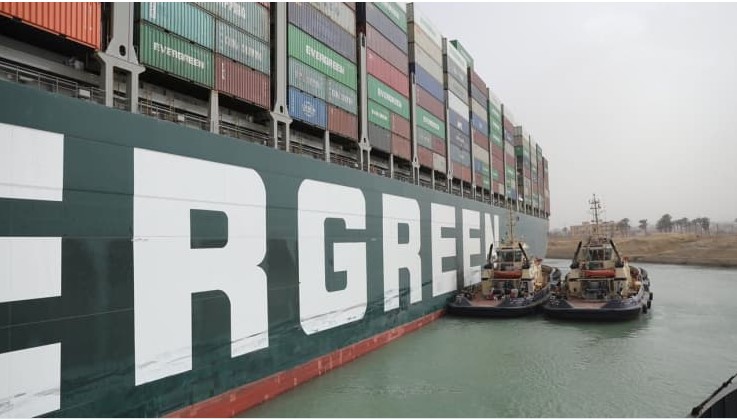Egypt and Suez ship owners agree on compensation
The ship blocked one of the world’s busiest trade routes, forcing companies to reroute ships and causing long tailbacks of hundreds of vessels

A preliminary compensation deal has been reached between the Egyptian authorities and the owners and insurers of the giant ship that blocked the Suez canal earlier this year.
The ship blocked one of the world’s busiest trade routes, forcing companies to reroute ships and causing long tailbacks of hundreds of vessels
The owners and insurers of the Ever Given and the Suez canal authority have been in dispute over compensation that has seen the container ship detained for months.
The canal’s authority initially demanded over $900m (£644m) to cover costs including for lost revenues and reputational damage while the ship was stuck on the canal.
The vessel’s Japanese owners and its insurers disputed the claim as well as its detention. The canal authorities later lowered the compensation request to $550m.
On Wednesday, the ship owner and insurers’ representatives and the canal’s chairman announced a deal – and said they would sign a final settlement soon.
The Ever Given had wedged across the Suez Canal for almost a week in March before it was freed on 29 March. Since then, it has been anchored in a lake between two stretches of the canal pending resolution of the compensation dispute.
The ship blocked one of the world’s busiest trade routes, forcing companies to reroute ships and causing long tailbacks of hundreds of vessels.
Suez Canal blockage delaying an estimated US$400 million
Reports suggest the stranded mega-container vessel, Ever Given in the Suez Canal was in March 2021, holding up an estimated $400 million an hour in trade, based on the approximate value of goods that are moved through the Suez every day, according to shipping data and news company Lloyd’s List.
Lloyd’s values the canal’s westbound traffic at roughly US$5.1 billion a day, and eastbound traffic at around US$4.5 billion a day.
The blockage is further stressing an already strained supply chain, said Jon Gold, vice president of supply chain and customs policy for the National Retail Federation.
“Every day that the vessel remains wedged across the canal adds delays to normal cargo flows,” he said, adding that the trade group’s members are actively working with carriers to monitor the situation and determine the best mitigation strategies.
“Many companies continue to struggle with supply chain congestion and delays stemming from the pandemic. There is no doubt the delays will ripple through the supply chain and cause additional challenges.”
The Suez Canal, which separates Africa from Asia, is one of the busiest trade routes in the world, with approximately 12% of total global trade moving through it.
Energy exports like liquified natural gas, Crude oil, and refined oil make up 5% to 10% of global shipments. The rest of the traffic is largely consumer products ranging from fire pits to clothing, furniture, manufacturing, auto parts and exercise equipment.
“The key to this problem hinges on how much longer it will take to move the Ever Given,” explained Alan Baer, president of logistics provider, OL USA LLC. “USA importers face arrival delays of three days right now and this will continue to grow as long as the disruption continues.”
SOURCE: ASAASE RADIO ONLINE


